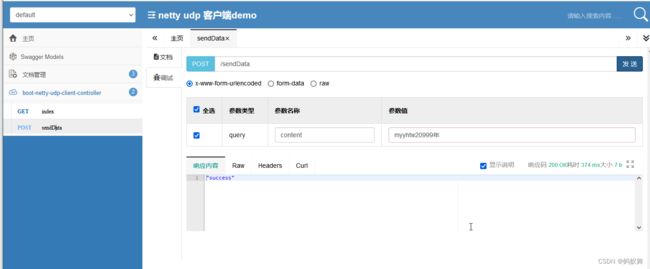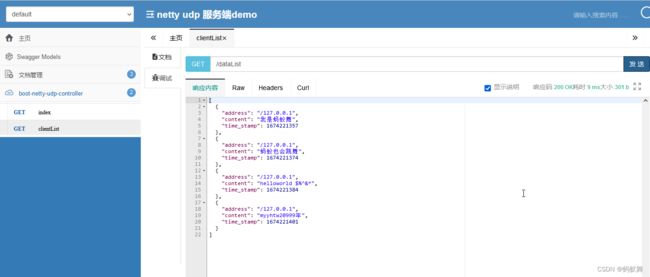Springboot+Netty搭建UDP客户端
使用Netty+SpringBoot方式可以快速地开发一套基于UDP协议的服务端程序,同样的也可以开发客户端,一般使用UDP都是使用原生的方式,发送消息后就不管不问,也就是不需要确定消息是否收到,这里使用Netty创建的客户端和服务端倒是能够类似http协议那样请求数据,得到返回数据,实际上得到的就是服务端原路返回的数据。
Demo地址:SpringBoot+Netty实现UDP服务端客户端的源码Demo
这里也使用SpringBoot+Netty创建,pom.xml文件导入依赖包
4.0.0
boot.base.udp.client
boot-example-base-udp-client-2.0.5
0.0.1-SNAPSHOT
boot-example-base-udp-client-2.0.5
http://maven.apache.org
org.springframework.boot
spring-boot-starter-parent
2.0.5.RELEASE
UTF-8
UTF-8
1.8
org.springframework.boot
spring-boot-starter-web
io.netty
netty-all
io.springfox
springfox-swagger2
2.9.2
com.github.xiaoymin
swagger-bootstrap-ui
1.9.2
org.springframework.boot
spring-boot-maven-plugin
repackage
Netty客户端的类,包含main方法(临时测试使用,实际还是使用springBoot的启动类)
package boot.example.udp.client.netty;
import java.net.InetSocketAddress;
import io.netty.bootstrap.Bootstrap;
import io.netty.buffer.Unpooled;
import io.netty.channel.Channel;
import io.netty.channel.ChannelOption;
import io.netty.channel.EventLoopGroup;
import io.netty.channel.nio.NioEventLoopGroup;
import io.netty.channel.socket.DatagramPacket;
import io.netty.channel.socket.nio.NioDatagramChannel;
import io.netty.util.CharsetUtil;
/**
* 蚂蚁舞
*/
public class BootNettyUdpClient {
public void bind(String address, int port, String data) {
EventLoopGroup eventLoopGroup = new NioEventLoopGroup();
try {
Bootstrap clientBootstrap = new Bootstrap();
clientBootstrap = clientBootstrap.group(eventLoopGroup);
clientBootstrap = clientBootstrap.channel(NioDatagramChannel.class);
clientBootstrap = clientBootstrap.option(ChannelOption.SO_BROADCAST, true);
clientBootstrap = clientBootstrap.handler(new BootNettyUdpClientSimpleChannelInboundHandler());
Channel channel = clientBootstrap.bind(0).sync().channel();
channel.writeAndFlush(new DatagramPacket(Unpooled.copiedBuffer(data, CharsetUtil.UTF_8), new InetSocketAddress(address,port))).sync();
// 与BootNettyUdpClientSimpleChannelInboundHandler中的ctx.channel().id().toString()是一样的值
System.out.println("channel_id = "+channel.id().toString());
// 方式一:查询等待超时 单位s 等待服务端原路返回的消息,
// 在channelRead0(ChannelHandlerContext ctx, DatagramPacket msg)方法中收到消息后可主动关闭channel,此处等待自然释放
channel.closeFuture().await(10000);
// 方式二:直接等待服务端原路返回后在channelRead0(ChannelHandlerContext ctx, DatagramPacket msg)方法中收到消息后可主动关闭channe
// 若服务端没有原路返回消息或者消息未收到将会一直等待,浪费资源
//channel.closeFuture().sync();
} catch (Exception e) {
// TODO: handle exception
} finally {
System.out.println("netty client udp close!");
eventLoopGroup.shutdownGracefully();
}
}
// 测试
public static void main(String[] args) {
// 向网段内的所有机器广播UDP消息,这个没试过是不是这个原理
// new BootNettyUdpClient().bind("255.255.255.255",9999,"I am client");
// 指定某个套接字地址和发送的内容可以发送消息
// 该方式也可以封装成一个udp的客户端的send类
new BootNettyUdpClient().bind("127.0.0.1",9999,"I am client");
}
}
服务端I/O数据读写处理类
package boot.example.udp.client.netty;
import io.netty.channel.ChannelHandlerContext;
import io.netty.channel.SimpleChannelInboundHandler;
import io.netty.channel.socket.DatagramPacket;
import io.netty.util.CharsetUtil;
/**
* 蚂蚁舞
*/
public class BootNettyUdpClientSimpleChannelInboundHandler extends SimpleChannelInboundHandler {
@Override
protected void channelRead0(ChannelHandlerContext ctx, DatagramPacket msg) throws Exception {
try {
String strData = msg.content().toString(CharsetUtil.UTF_8);
//打印收到的消息
System.out.println("msg---"+strData);
// 与BootNettyUdpClient中的channel.id().toString()是一样的值
System.out.println(ctx.channel().id().toString());
// 收到服务端原路返回的消息后,不需要再次向服务端发送消息, 可以在这里暴力关闭,也可以在 channelReadComplete(ChannelHandlerContext ctx)内
// ctx.close();
} catch (Exception e) {
System.out.println(e.toString());
}
}
/**
* 重写方法
* 结构:
* 1.public class BootNettyUdpClientSimpleChannelInboundHandler extends SimpleChannelInboundHandler
*
* 2.public abstract class SimpleChannelInboundHandler extends ChannelInboundHandlerAdapter
*
* 3.public class ChannelInboundHandlerAdapter extends ChannelHandlerAdapter implements ChannelInboundHandler
*
* ChannelInboundHandlerAdapter类有诸多方法可以重写,可以根据具体需求来写
*
*/
@Override
public void channelReadComplete(ChannelHandlerContext ctx) throws Exception {
super.channelReadComplete(ctx);
System.out.println("关闭channel");
ctx.close();
}
@Override
public void exceptionCaught(ChannelHandlerContext ctx, Throwable cause) throws Exception {
cause.printStackTrace();
ctx.close();
}
}
BootNettyUdpClientApplication
package boot.example.udp.client;
import org.springframework.boot.SpringApplication;
import org.springframework.boot.autoconfigure.SpringBootApplication;
/**
* 蚂蚁舞
*/
@SpringBootApplication
public class BootNettyUdpClientApplication {
public static void main( String[] args ) {
SpringApplication app = new SpringApplication(BootNettyUdpClientApplication.class);
app.run(args);
System.out.println( "Hello World!" );
}
}
BootNettyUdpClientController
package boot.example.udp.client.controller;
import boot.example.udp.client.netty.BootNettyUdpClient;
import org.springframework.web.bind.annotation.GetMapping;
import org.springframework.web.bind.annotation.PostMapping;
import org.springframework.web.bind.annotation.RequestParam;
import org.springframework.web.bind.annotation.RestController;
/**
* 蚂蚁舞
*/
@RestController
public class BootNettyUdpClientController {
@GetMapping(value = {"", "/"})
public String index() {
return "netty springBoot udp client demo";
}
@PostMapping("/sendData")
public String sendData(@RequestParam(name="content", required = true) String content) {
if(content != null && content.length() > 0){
new BootNettyUdpClient().bind("127.0.0.1",9999,content);
return "success";
}
return "fail";
}
}
SwaggerConfig UI访问配置
package boot.example.udp.client;
import com.google.common.base.Predicates;
import org.springframework.context.annotation.Bean;
import org.springframework.context.annotation.Configuration;
import springfox.documentation.builders.ApiInfoBuilder;
import springfox.documentation.builders.PathSelectors;
import springfox.documentation.builders.RequestHandlerSelectors;
import springfox.documentation.service.ApiInfo;
import springfox.documentation.spi.DocumentationType;
import springfox.documentation.spring.web.plugins.Docket;
import springfox.documentation.swagger2.annotations.EnableSwagger2;
/**
* 蚂蚁舞
*/
@Configuration
@EnableSwagger2
public class SwaggerConfig {
@Bean
public Docket createRestApi(){
return new Docket(DocumentationType.SWAGGER_2).apiInfo(apiInfo()).select()
.apis(RequestHandlerSelectors.any()).paths(PathSelectors.any())
.paths(Predicates.not(PathSelectors.regex("/error.*")))
.paths(PathSelectors.regex("/.*"))
.build().apiInfo(apiInfo());
}
private ApiInfo apiInfo(){
return new ApiInfoBuilder()
.title("netty udp 客户端demo")
.description("netty udp 客户端接口测试demo")
.version("0.01")
.build();
}
/**
* http://localhost:xxxx/doc.html 地址和端口根据实际项目查看
*/
}
代码结构
├─boot-example-base-udp-client-2.0.5
│ │ pom.xml
│ │
│ ├─src
│ │ ├─main
│ │ │ ├─java
│ │ │ │ └─boot
│ │ │ │ └─example
│ │ │ │ └─udp
│ │ │ │ └─client
│ │ │ │ │ BootNettyUdpClientApplication.java
│ │ │ │ │ SwaggerConfig.java
│ │ │ │ │
│ │ │ │ ├─controller
│ │ │ │ │ BootNettyUdpClientController.java
│ │ │ │ │
│ │ │ │ └─netty
│ │ │ │ BootNettyUdpClient.java
│ │ │ │ BootNettyUdpClientSimpleChannelInboundHandler.java
│ │ │ │
│ │ │ └─resources
│ │ │ application.properties
│ │ │
│ │ └─test
│ │ └─java
│ │ └─boot
│ │ └─example
│ │ └─udp
│ │ └─client
│ │ BootNettyUdpClientApplicationTest.java
│ │ UDP客户端代码和UDP服务端代码测试
先启动一个服务端,可以看服务端的博文地址(SpringBoot搭建基于UDP协议的服务端)
再启动一个客户端,启动成功后可以在浏览器访问
服务端
http://localhost:8092/doc.html
客户端
http://localhost:8091/doc.html我们在客户端发送消息,发送了几条,包含中文
服务端查看发送的数据列表
[
{
"address": "/127.0.0.1",
"content": "我是蚂蚁舞",
"time_stamp": 1674221357
},
{
"address": "/127.0.0.1",
"content": "蚂蚁也会跳舞",
"time_stamp": 1674221374
},
{
"address": "/127.0.0.1",
"content": "helloworld $%^&*",
"time_stamp": 1674221384
},
{
"address": "/127.0.0.1",
"content": "myyhtw20999年",
"time_stamp": 1674221401
}
]可以看到自己用程序写的客户端和服务端代码 发送把编码统一后是可以保证中文不乱码的,但是使用一些小工具可能就会出现乱码
在这里每次使用发送都会调用一次
new BootNettyUdpClient().bind("127.0.0.1",9999,"I am client");有时候在使用udp的时候,一般不需要接收返回数据(如果有接收返回数据,还是建议使用netty的客户端方式,稳定些)
BootNettyUdpClientApplicationTest
package boot.example.udp.client;
import java.io.IOException;
import java.net.DatagramPacket;
import java.net.DatagramSocket;
import java.net.InetSocketAddress;
import java.net.SocketException;
import java.nio.charset.StandardCharsets;
/**
* 蚂蚁舞
*/
public class BootNettyUdpClientApplicationTest {
public static void main(String[] args) {
netUdpSend("netUdp我是蚂蚁舞");
netUdpSend("蚂蚁也会跳舞");
netUdpSend("$%^&myw");
}
public static void netUdpSend(String data) {
DatagramSocket ds;
try {
ds = new DatagramSocket();
byte[] bytes = data.getBytes(StandardCharsets.UTF_8);
DatagramPacket dp = new DatagramPacket(bytes,bytes.length, new InetSocketAddress("127.0.0.1", 9999));
try {
ds.send(dp);
System.out.println("udp send success-" + data);
} catch (IOException e) {
System.err.println("udp send fail-" + e);
}
ds.close();
} catch (SocketException e) {
System.err.println(e.toString());
}
}
}
再看看服务端的收到的数据
没有问题的,使用springBoot+Netty搭建UDP客户端和服务端,在某些场景下是可以搭配使用的


